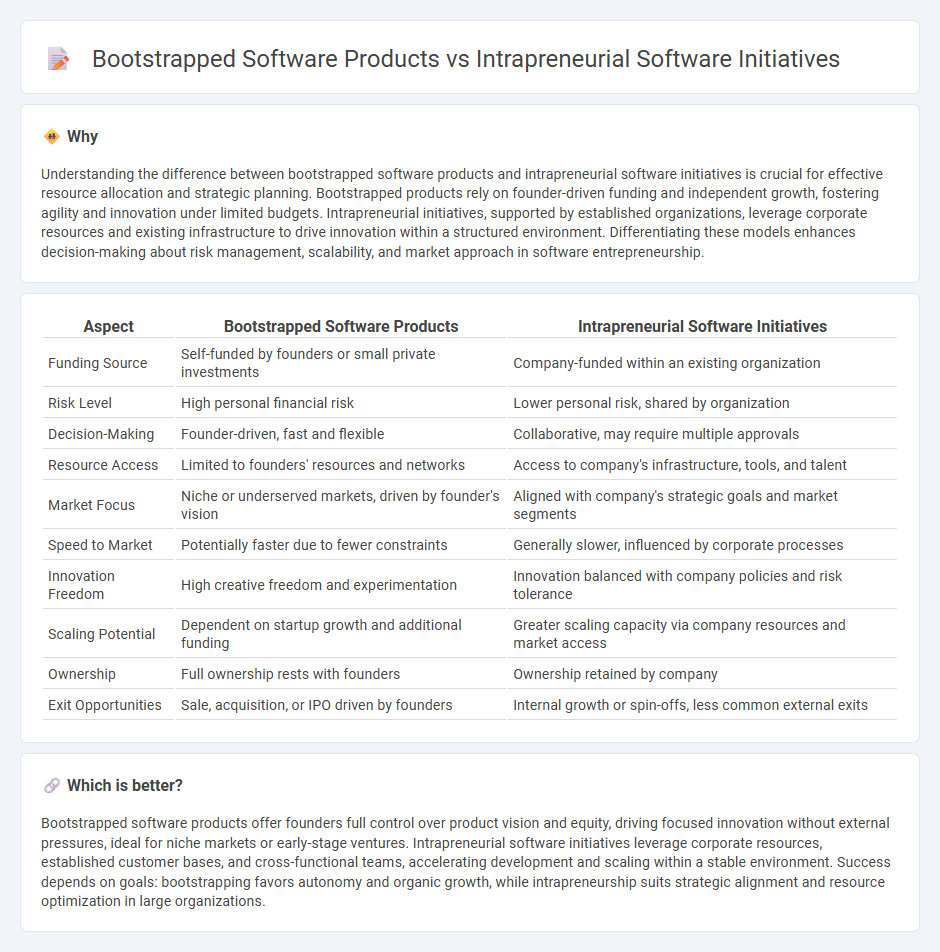
Bootstrapped software products are developed and funded independently by entrepreneurs who assume full financial risk and control, enabling rapid innovation and agile decision-making. Intrapreneurial software initiatives operate within established organizations, leveraging existing resources and market reach while fostering internal innovation to drive growth and competitive advantage. Explore the key differences and benefits of each approach to determine the best strategy for your software project.
Why it is important
Understanding the difference between bootstrapped software products and intrapreneurial software initiatives is crucial for effective resource allocation and strategic planning. Bootstrapped products rely on founder-driven funding and independent growth, fostering agility and innovation under limited budgets. Intrapreneurial initiatives, supported by established organizations, leverage corporate resources and existing infrastructure to drive innovation within a structured environment. Differentiating these models enhances decision-making about risk management, scalability, and market approach in software entrepreneurship.
Comparison Table
| Aspect | Bootstrapped Software Products | Intrapreneurial Software Initiatives |
|---|---|---|
| Funding Source | Self-funded by founders or small private investments | Company-funded within an existing organization |
| Risk Level | High personal financial risk | Lower personal risk, shared by organization |
| Decision-Making | Founder-driven, fast and flexible | Collaborative, may require multiple approvals |
| Resource Access | Limited to founders' resources and networks | Access to company's infrastructure, tools, and talent |
| Market Focus | Niche or underserved markets, driven by founder's vision | Aligned with company's strategic goals and market segments |
| Speed to Market | Potentially faster due to fewer constraints | Generally slower, influenced by corporate processes |
| Innovation Freedom | High creative freedom and experimentation | Innovation balanced with company policies and risk tolerance |
| Scaling Potential | Dependent on startup growth and additional funding | Greater scaling capacity via company resources and market access |
| Ownership | Full ownership rests with founders | Ownership retained by company |
| Exit Opportunities | Sale, acquisition, or IPO driven by founders | Internal growth or spin-offs, less common external exits |
Which is better?
Bootstrapped software products offer founders full control over product vision and equity, driving focused innovation without external pressures, ideal for niche markets or early-stage ventures. Intrapreneurial software initiatives leverage corporate resources, established customer bases, and cross-functional teams, accelerating development and scaling within a stable environment. Success depends on goals: bootstrapping favors autonomy and organic growth, while intrapreneurship suits strategic alignment and resource optimization in large organizations.
Connection
Bootstrapped software products and intrapreneurial software initiatives both emphasize resourcefulness and innovation within constrained environments to develop scalable solutions. Entrepreneurs in both domains focus on validating market needs, leveraging agile development, and iterating quickly without extensive external funding. This connection fosters a culture of ownership and proactive problem-solving that drives product-market fit and sustainable growth.
Key Terms
Resource Allocation
Intrapreneurial software initiatives leverage corporate resources, including funding, talent, and infrastructure, to drive innovation within established organizations, enabling rapid development and scalability. Bootstrapped software products rely exclusively on founders' personal capital and lean operations, emphasizing cost efficiency and organic growth with minimal external dependencies. Explore in-depth differences and strategic implications between these approaches for optimized resource management.
Autonomy
Intrapreneurial software initiatives benefit from organizational resources but face constraints in autonomy due to corporate policies and strategic alignment. Bootstrapped software products maintain full creative control and decision-making independence, fostering innovation driven solely by the founders' vision and market feedback. Explore the distinct advantages of autonomy in these software development approaches to optimize your project's success.
Risk Tolerance
Intrapreneurial software initiatives benefit from organizational support, reducing financial risk but often limiting innovation freedom due to corporate constraints. Bootstrapped software products face higher personal financial risk, driving founders to prioritize lean development and rapid market validation. Explore the nuances of risk tolerance in software entrepreneurship for strategic decision-making.
Source and External Links
Intrapreneurship: Empowering Employees to Drive ... - Intrapreneurial software initiatives involve platforms like ITONICS Innovation OS that enable companies to foster intrapreneurship through trend spotting, structured ideation and incubation processes, and performance tracking to empower employees in driving innovation internally.
Fuel Your Team's Entrepreneurial Drive - Software like Ideanote supports intrapreneurship by providing a structured platform to collect, develop, and implement employee ideas, accelerating innovation, enhancing operational agility, and helping organizations sustain a culture of internal entrepreneurship.
Intrapreneurship: why and how to set it up - Successful intrapreneurial software initiatives often include formal programs with platforms for initiative submission and collective feedback, clear project criteria, budget allocation, and HR support to enable employees to innovate within the company.
 dowidth.com
dowidth.com